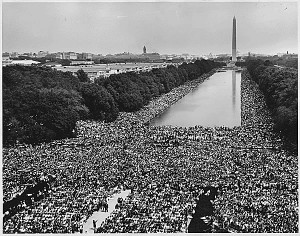People can read about the 1963 March on Washington for Jobs and Freedom in textbooks, and they can watch clips of Dr. Martin Luther King Jr.’s “I Have a Dream” speech on YouTube, but one employee of Sinclair Community College, Dr. Robert Obach, can tell you about it from firsthand experience because he was there for it all.
Obach, who teaches philosophy, arrived in Washington D.C. in June of 1963 and was living in a religious community when he heard the news about the upcoming March on Washington.
“My brothers in this community started talking, ‘should we go to (the March on Washington), it’s going to be a historic event?’ Well, I started thinking I’d like to be there at a historic event so I went,” Obach said.
Obach said he and his brothers in the community gathered around the Washington Monument and then walked about a mile down Constitution Avenue to the Lincoln Memorial with thousands of people, mostly African-Americans and some Caucasians, singing “We Shall Overcome” because they all supported the idea of justice and freedom.
Obach said the brothers he marched with decided to leave because it was too crowded, but he stayed and soaked it all in. Obach said he struck up conversations with African-Americans in the crowd that told him how they felt about civil rights.
“I learned about how they hated segregation because it cuts them off and shuts them out,” Obach said. “So here they are explaining to me, a white boy around 21 years old, what it’s like (to be African-American at the time) and I’m picking up this information like gee, this is amazing.”
Obach said he met Jackie Robinson that afternoon during the speeches of integration leaders.
“The people behind me started moving aside to let someone through and it was Jackie Robinson. I recognized him as Jack, put out my hand and he shook it,” he said.
Later that afternoon Dr. Martin Luther King Jr. gave the keynote address where he shared his famous “I Have a Dream” speech.
“I knew the speech was inspiring,” Obach said. “I didn’t know it would become that famous though.”
Looking back in hindsight, Obach said King’s speech was the keynote address for civil rights for all Americans.
“I think it was a pivotal moment in American history,” Obach said. “A real step forward into liberty, justice and freedom.”
Obach added, “I felt so much a part of things, I felt belonging. I felt like we’re on the move now, that we’re going someplace, that we’re going to accomplish something and that we’re going to do it together.”

